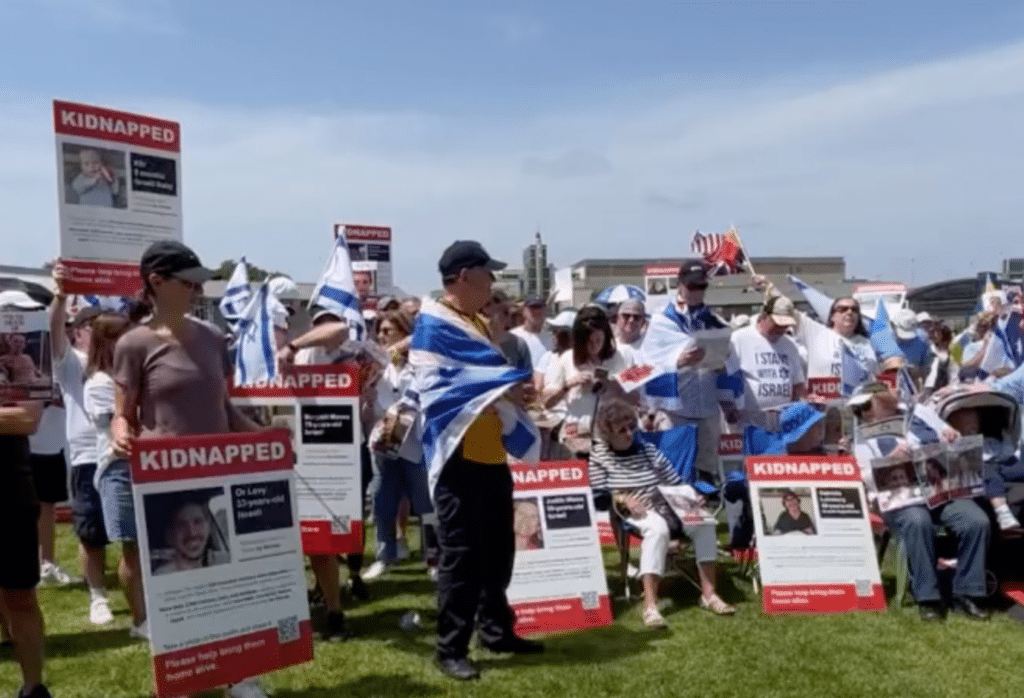The NSW government is set to review a section of the Crimes Act, which criminalises threats or incitement of violence over religious or racial grounds.
Premier Chris Minns confirmed on Monday his government has plans to tighten Section 93Z, after charity groups including the Jewish Board of Deputies and Faith NSW lobbied the government about laws they have described as “ineffective and impotent”.
Amid the ongoing protests over the Israeli-Palestine conflict, which has seen rising antisemitism and anti-Arab incidents, Premier Minns said “something has got to change.”
“If you’re going to have a law on the books saying racial vilification and hate speech is not allowed in NSW, then it can’t be toothless,” the premier said. “There is naked racism in our community, and incitement to violence. So something has got to change.”
“I don’t think anyone with a straight face would make the claim that hate speech has been extinguished in this state. The laws have to reflect what’s happening on the ground.”
Minns stressed the importance of effective hate speech laws in protecting vulnerable groups.
“Right now you would assume they’d be deployed to protect members of our Jewish community,” he said.
“But tomorrow they might be used for members of the Hindu community and the day after that for members of the Muslim community.”
Since it was introduced in 2018, the law hasn’t resulted in a single successful prosecution, and many groups believe it is no longer fit for purpose.
Section 93Z of the Crimes Act states that it is illegal to “intentionally or recklessly threaten or incite violence” against someone – through a public act – based on their race, religious beliefs or affiliation, sexual orientation or other characteristics.
Penalties include up to three years in prison or an $11,000 fine for individuals.
CEO of Faith NSW, Murray Norman said despite the laws being “well-meaning”, it was “clearly … not serving their purpose”.
“The laws that were introduced five years ago to prosecute those who publicly threaten or incite racial and religious violence have proved to be ineffective and impotent,” Norman told The Daily Telegraph.
“It is important that the intent of the law championed by so many in 2018 can be appropriately captured in the Crimes Act so that they can be effectively used.”
Peter Wertheim, co-CEO of the Executive Council of Australian Jewry, agreed that it was “definitely time to review the whole range of laws that we have in this area”.
“Usually what happens in practice is that hate preachers and protesters stir up violent emotions in people – but without going so far as to urge them to take violent action, and therefore a prosecutor will not be able to prosecute a person under that section,” he said, adding that we need to “get away from an exclusive reliance on concepts, like ‘threats’ or ‘incitement’ and broaden the law to prohibit the promotion and advocacy of violence.”
Wertheim believes the law should be expanded to criminalise “the promotion or the advocacy of violence”, not just incitement.
“The concept of incitement involves rousing people to act violently in some way,” he said.
“In practice, what usually happens with hate preachers or protesters is that the speech will stir up violent emotions in people but stop short of expressly urging them to commit an act of violence.”
Ongoing investigations
NSW Police are currently investigating two incidents that may fall under this section of the Crimes Act.
The first is a controversial sermon delivered at the Al-Madina Dawah Centre in Bankstown last month, and posted on the religious centre’s YouTube account, where an Islamic preacher, ‘Brother Ismail’, warned that the Australian government was “pushing Muslims into a corner” over the Gaza conflict, adding that jihad was the “solution”.
“If the Australian government likes it or not, if the Asio likes it or not, if they want to deport me from Australia or not, the jihad is the solution for the ummah (community),” he said.
The second incident took place on October 9, when protesters outside the Sydney Opera House were caught on camera, reportedly shouting anti-semitic views, including “f— the Jews” and “gas the Jews”.
The Australian Jewish Association released unverified footage that appeared to show a small group outside the Opera House lighting flares and chanting the anti-Semitic slogans.
Opposition Leader Mark Speakman stressed the importance of remembering “…there hasn’t yet been any court outcome showing any need for reform”.
“We have to be careful not to allow the law to be weaponised against controversial free speech which doesn’t justify a criminal sanction,” Speakman said.
“The best thing that Chris Minns can do is find a more active and capable police minister who won’t just stand by as these issues escalate.”
Currently, for a prosecution to result in a conviction for religious or racist hate speech, the Director of Public Prosecutions (DPP) must sign off on it.
According to The Daily Telegraph the government is considering scrapping this prerequisite.
NSW Jewish Board of Deputies President David Ossip called the DPP approval requirement “the most problematic element.”
“It is clear that incitement laws in NSW need to be strengthened when hate preachers can freely make sermons that call for the murder of Jews, or individuals can chant ‘Gas the Jews’ on the forecourt of the Opera House, and escape prosecution,” he said.



